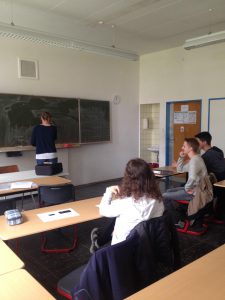
Schuyler Cowan, 2015-2016, Fulbright English Teaching Assistant to Germany and Reach the World Traveler
In partnership with Reach the World (RTW), the Fulbright U.S. Student Program is publishing a series of articles written by Fulbright English Teaching Assistants participating in Reach the World’s Traveler correspondents program, which through its interactive website, enriches the curriculum of elementary and secondary classrooms (primarily located in New York City but also nationwide) by connecting them to the experiences of volunteer Fulbright English Teaching Assistants (ETAs) and other world travelers who are currently studying and living abroad.
It is important to be able to view a situation or problem from more than one perspective. If you can think about how someone else might resolve a problem, then you may have an easier time solving it. This is why traveling and living abroad are such important experiences. Living in Germany has not only opened my eyes up to new perspectives, but it has also helped me form my own. This is especially true for my work as a language assistant in a German school.
When I first arrived at my school in Germany, I had an idea of what my experience would be like based on books I had read and movies I had seen. Some of these ideas reflected stereotypes about Germany. Stereotypes are popular ideas about places or people that are often exaggerated or wrong. Do you know what any of those stereotypes might have been? Think back to the interview I did with my colleagues, Klaudia and Jana. What did they say about Germans? One of these ideas was that all Germans are punctual. This means that they are always on time and they like discipline. I thought that the classroom environment would be very quiet and strict. I was in for a big surprise!
I began to help teachers in different classes and was surprised to see that students often spoke while the teacher was talking.

Schuyler Cowan, 2015-2015, Fulbright English Teaching Assistant to Germany, playing hangman with her students
This surprised me because at my school in the United States, you are normally never supposed to talk while the teacher is talking, and you might get in big trouble if you did. When I started teaching, I made this very clear to my students! They were very interested to learn about what school in the United States was like because they have seen so many American movies. Can you think of any movies about American schools? What stereotypes were conveyed?
While I expected German students to be very disciplined, they expected all American students to play sports and musical instruments. They thought that the importance of sports often outweighed the importance of academics in the Untied States. I was interested to hear my students’ ideas about Americans and they were interested to learn about what Americans (the ones I know at least) thought of Germans. Of course, there are the basic stereotypes, like that all Germans wear dirndls and lederhosen (remember what they look like?) and that all Americans eat McDonald’s for every meal. However, what we discovered is that we actually are not so different from one another. We listen to a lot of the same music, like Beyoncé and Adele. We like the same movies and TV shows, and we can all agree on the importance of learning another language!
This is what I love about traveling. My students and I came into the classroom with preconceived ideas about each another. After many interesting conversations, however, we not only learned how alike we are, but we also were also able to learn from each others’ cultures! What did I learn from my students? Well, I have learned about their commitment to and enthusiasm for learning other languages.
This is something that is encouraged by the German school system where I teach and, in my opinion, is something we could all learn from (you are already doing a great job by showing interest in new places!). What did my students learn from me? They learned that Americans are just as committed to learning as they are to sports, and that sports help teach important skills like leadership and teamwork.
The best part about my experience abroad is that I keep learning new things every day. I also keep sharing knowledge about useful skills, like how to give a good speech or present fun information about American holidays. I think that if every one in the world were able to understand someone else’s perspective and look beyond the stereotypes, we would have fewer conflicts. I am sure that one day you will be able to experience this too, as will my wonderful students in Germany!

No Comments